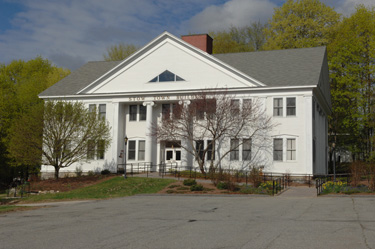
By Nancy Arsenault
Now that 63% of the state’s voters have approved the placement of medical marijuana facilities in communities, will Stow be one of these locations? The Planning Board held a forum last week to gauge public opinion, but with few attendees, they did not come away with much resident input, leaving the regulating process, at least at this point, fully in the hands of town government.
At the October 28 Special Town Meeting, the Planning Board is asking voters to approve a one year moratorium on the placement of any such facilities within the Town of Stow. This would allow time for town government to observe the process in other communities while drafting bylaw wording to address these businesses if and when they do come to Stow. While a community cannot prohibit their existence, it can control where they choose to set up, specify security measures and determine other local regulations.
Many fall Town Meetings are expected to address similar moratorium requests, so much so that medical marijuana facility applicants have complained to state officials that they are essentially being shut out of potential locations, according to the transcript of a public meeting held recently in Somerville. Presently, 130 towns have already approved moratoriums, an option allowed by DPH and within the parameters of the new law. These moratoriums, once expired, cannot be extended, so towns looking to formulate their own regulations only have this one year period to do so, if the moratorium is approved by voters.
The Massachusetts Municipal Association is one group encouraging towns to approve the moratoriums. Geoffrey Beckwith, executive director of the MMA, said “Communities need time to write detailed and comprehensive ordinances and bylaws to safeguard the public interest when it comes to the sale of a drug that has been illegal up until this year.”
The Massachusetts Department of Public Health is now reviewing 181 applications from proposed marijuana cultivators and dispensaries, who all hope to be awarded one of 35 state licenses in January. Each county will be awarded up to 5 licenses. Middlesex County has 47 qualified applicants after Phase I of the approval process, and nearby Worcester County has 14. In Bolton, the former Sotheby Auction House has been considered by one applicant to be an ideal location, with space for cultivation and processing and also retail sales, with easy access to customers from Rt. 495. At this time, according to state officials, no applications have specifically listed a Stow location, but in Phase II, specific location choices will have to be noted on the applications.
Ann Roache of the DPH said that of the 47 Phase I applicants in Middlesex County, those who wish to continue into the Phase II approval process, will be given special directives by the DPH. “At the time of such notice, an applicant must notify the chief administrative officer and chief of police of the proposed city or town in which a facility would be sited and the sheriff of the applicable county, of the intent to submit a Phase 2 application,” said Roache.
Roache said part of the approval criteria being reviewed by DPH, will be a measure of the support for such a facility by a host community. Positive support could be indicated by a town that rejects a moratorium proposal, as did the Town of Ayer recently, when they voted against a moratorium and opened up their town to applicants to publicly explore locations there.
In a meeting last week, Stow Public Health Agent Jack Wallace said that Stow may actually find that it is home to a number of “hardship” cases, rather than actual facilities which he feels may look to operate in more populated areas. Hardship cases are those patients whom the state agrees would not be able to get themselves to a medical marijuana facility, based on the extent of their illness, lack of personal transportation or access to public transportation, financial issues, and other considerations. These people could apply to DPH for approval to cultivate marijuana for medicinal use on their private property. This is one aspect of the new law that town officials would be considering incorporating into bylaw regulations. Stow Police Chief Bill Bosworth said that perhaps these locations would need to be confidentially known to police, though the patient’s HEPA guidelines could not be violated in the process.
Bosworth was also concerned about security at any cultivating, processing or distribution facility that chooses to locate here, stating that 24- hour security in a variety of forms would be needed at all locations, and would be something necessary to include in a bylaw. Members of various town departments also discussed what areas in town should be considered as acceptable locations. It was agreed that industrial/commercial sites would be the most adaptive, including large buildings on White Pond Road or at the Minute Man Airfield, if those property owners looked to lease or sell space to such facilities. Those locations would all be part of the specific Bylaw wording, including keeping the facilities away from any schools or childcare centers, said Bosworth. Wallace said that Stow’s lack of a municipal water supply could deter applicants from looking at Stow, as the water required to grow the plants and process them, could make it a costly proposition in Stow.
The Planning Board is collecting opinions on the topic from residents and will ultimately be the group crafting the bylaw wording. Any residents wishing to offer input should contact the Planning Board at
(978) 897-5098.

